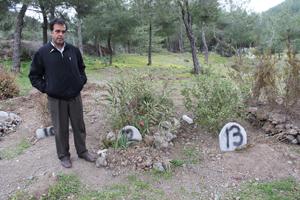Landmines cut off escape route of those fleeing Syrian violence
Syrian lawyer Ahmed Hasoun, from B’dama, stands in a graveyard in Yayaldagi, Turkey, near fresh graves for some of the Syrians who died of injuries crossing the border. (Photo by Matthew Brunwasser.)
In this sleepy Turkish bordertown, locals pass the time playing a dominos-like game and drinking strong black tea from tulip-shaped glasses.
It’s here that a Syrian refugee named Mahmoud tells his story about the government offensive in Idlib. He arrived on Saturday from Jisr Al Shigur, a town in the Idlib region. He was scouting an escape route for his family. He found the situation was worse than expected.
“If I could return to Syria to get my family and bring them here I would,” Mamoud said. “But I would be killed if I went back now because of all the snipers, tanks and soldiers in the mountains. I will try but if I can’t we’ll have to depend on God.”
He said the shooting started on Friday. Before he left, friends had warned him that the Syrian military had recently placed landmines in fields favored by refugees fleeing Syria. On his seven-hour journey by foot, he says he saw the freshly turned earth where they had been placed. Human Rights Watch released a statement Tuesday condemning the use of anti-personnel mines in the border regions.
“A huge number of tanks, APCs (armored personal carrier), about 40 BMP tanks, 50 or 60 vehicles with soldiers, 10-15 cannons,” said Mahmoud. “And the Shabiha militia’s pickup trucks with machine guns mounted in the back. I saw this convoy with my own eyes as I was leaving.”
There were reports Tuesday of fighting in Idlib between the Free Syrian Army rebel movement and government forces.
Mustafa Haid, a Syrian human rights researcher, said the military is moving to control the city before international demands are realized for a humanitarian corridor to deliver aid.
“They talk about these secure lines for humanitarian aid and buffer zones, some countries have started talking about that,” Haid said. “It sounds like the regime knew Idlib would be the perfect place to do such things. And that’s why they want to make sure they’d keep Idlib under control.”
Haid said he saw the mines in the field during his research.
“This kind of mine is Russian-made and it’s called BMN2,” he said. “It’s also a pressure mine, only (33 pounds) are needed to explode it. It’s not (66 or 88 pounds). It’s even anti-children. Which means that they didn’t put it there because they are afraid of the Free Syrian Army going back and forth to Turkey. They just want to kill people. They are placed in known refugee crossings.”
Haid met a Syrian living along the border who received anti-mining training during his military service. The man personally removed 300 mines near his home but had no training in how to defuse them.
“He crossed (about 6.2 miles) with one in his hand to show it to me just to take a photo to show me for proof that they are placing landmines,” Haid said.
Leaders of the FSA believe the new Assad offensive is about projecting power rather than capturing land. Captain Ayham al-Kurdi, an FSA commander, said the government has been sending forces to Idlib for several weeks. Al-Kurdi doesn’t expect Assad to destroy the entire city, just a neighborhood, to set an example.
“He wants to terrorize Idlib by staging strategic attacks and create maximum terror among the civilians,” said al-Kurdi. “He is making a massacre in each city in the north. And just like they did in Hama, in the massacre of 1982, the rest of the country was so afraid that they did not even react.
Al-Kurdi said Idlib has opposed the regime since Bashar Al Asaad’s father, Hafez Al Assad, first took power in the 1970s. Recent government campaigns have driven almost all of the rebels out of the cities. Al Kurdi said Idlib will be a hard battle, and a long battle, because the mountainous terrain of northern Syria is favorable to the rebels’ guerrilla tactics.
